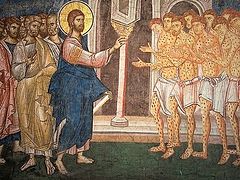You must thank God for sending you everything. This is for three reasons: in order to bring you to your senses, to awareness, and to gratitude (St. Ambrose).
If we do not give gratitude and glory to God, Who lives in the highest in inapproachable light, for everything sorrowful or painful that strikes us, and even for consolations—we deprive ourselves of Christ’s peace that surpasses every mind… (St. Ambrose)
We get depressed and forgetful, and from depression and forgetfulness we often cease to be thankful to God for His great benefactions to us, both temporal and eternal. According to St. Isaac the Syrian, the thankfulness of one who receives encourages the Giver to give even greater gifts than the first. Gratitude in a Christian is such a great thing that together with love, it follows him into the future life, where he will celebrate the eternal Pascha (St. Ambrose).
We show ourselves to be ungrateful before the All-Merciful God when, though we be immersed to our necks in the water of His grace, we faint from thirst: We worry, complain, and despair. And though we’re honored by God with all manner of good things, we do not recognize it and are like mindless cattle. What has God not given us? And what would He not want to give to us?.. After our physical birth we have received eternal life from our spiritual birth, by which we have been adopted and united in one spirit with the spirit of God. In the field of life we are surrounded by everything needed for body and soul. For the body we have food of every kind, from the animals—cattle, birds, and fish—as well as multitudinous fruits of the earth; we have water for everything, and fire as well. The sun gives us light and warms us, the moon and the stars are luminous. We have clothing and a house to provide us rest. We have all this in abundance, as opposed to many others (St. Moses).
You are always disposed to thank the Most Merciful and Greatly Munificent Lord that He has not rewarded you according to your sins; but according to His unspeakable mercy He has given you the means for your salvation! And the well-experienced fathers approve of these feelings, because the 102nd Psalm agrees with divine Scripture. But caution is also approved, so that we might not fall again into faintheartedness (St. Leo).
A heart and lips that give thanks to God for all things attract His merciful good will to us, but God does not endure the complainer, and may even punish him. And in your interpersonal relations strive to encourage one another, and not bring sadness upon each with your insane judgments of each other (St. Joseph).
In order to smooth out such sins and receive blessedness in life beyond the grave we need to bear everything with gratitude to God. People have lived in earthen huts and did not sorrow over this. A demon is trying to kick you out of the monastery; he wants to destroy all your works of longsuffering. Do not listen to him, that thief (St. Joseph).
It is immeasurably catastrophic to grieve and kill yourself before the time, but everyone should rather thank the Lord, no matter how He might punish us with His lessons in this world… (St. Leo).
Sorrows and sickness I have found, and I have called out unto the Lord (Ps. 114:3), says Holy King David. We are also impoverished on the same path, and on what other may we find help? In thankfulness to the Most Merciful God, Who works in all thing for the good (St. Moses).
We must give thanks for all things to the Lord, Who justly places upon us labors and patience, which are more profitable to us than consolation—for consolation puffs up the soul (St. Moses).
For the soul we have, first of all, our mind and conscience given to us at our birth; secondly, we have the grace of the Spirit, combined and mingled with our souls in the sacraments from birth. We also have the written law of God, open to anyone, for our everyday remembrance; moreover we have innumerable God-inspired books, which nourish our souls and all virtues. We have the Holy Church, our Mother, with all that our soul needs in the God-given sacraments. We have always and everywhere the servants of those mysteries, we have God-bearing fathers, kind benefactors, and counselors in our needs… Everything that you have now, just as before, you have not from yourself. God has poured out these good things upon you, for He is a loving Father, incomparable to any father in the world. And He demands nothing of anyone upon whom He showers his munificence other than love and gratitude to Him. But where is your gratitude, or mine? Where is the love? You are almost continually angry, murmuring, and denigrating people. I don’t see you zealously bringing forth the sacrifice of praise, the sacrifice of humility and contrition acceptable to God. Inasmuch as you are unable to undertake the difficult labor of acquiring the virtues, then at least have true and direct self-reproach before God and man: Reproach yourself that you are showered with God’s blessings all around and yet you are so insensitive that instead of gratitude for the Lord’s benefits, you spout forth complaints, as if you had never received anything from Him and now have nothing. It seems that there is nothing that God has withheld from you; you have had and still have everything you need for your body and soul. Why can’t you live in peace? (St. Moses)
Thank God for all things, as well for the opportunity to read the prayers to the sisters and have thus been vouchsafed to serve them in this. But it is not good to think that this will be accounted to you. Accounted to us is the great sacrifice that Sweetest Jesus offered for us on the cross of Eternal Righteousness. But we have nothing good of our own (St. Anatoly).
You should be thankful, a thousand times thankful, that you are protected from the wolves, that you are watched over, and taken care of. And accept joyfully whatever punishment you are given. Blessed is he whom Thou hast chastened, O Lord! (St. Anatoly).
That you have joined the monastery is good, and you should always thank God for this. Of course, the devil will not cease to trouble you, saying that it’s better to live in the world. But we must listen to God and His angels, and not the devil (St. Anatoly).
Question: “If people thank me and show their love, I feel as if guilty, and my soul feels heavy.” Answer: “Count it all to God’s help…" Say: “The Lord helped and not I. He is the One to thank” (St. Anatoly).
If you are able to do something good for someone or give alms, then you should say, “I did it with Your blessing, Lord!” St. Nektary.
With God’s help, try to dispose yourself in such a way that you would be able to hold to your interior ascetic labor; which, according to the Apostle, consists of four parts: “Be patient toward all men, rejoice evermore, pray without ceasing, and in everything give thanks” (cf. Thess. 5:14:16–18). We should begin with the last part—that is, giving thanks for everything. The beginning of joy is to be content with your own situation (St. Ambrose).





